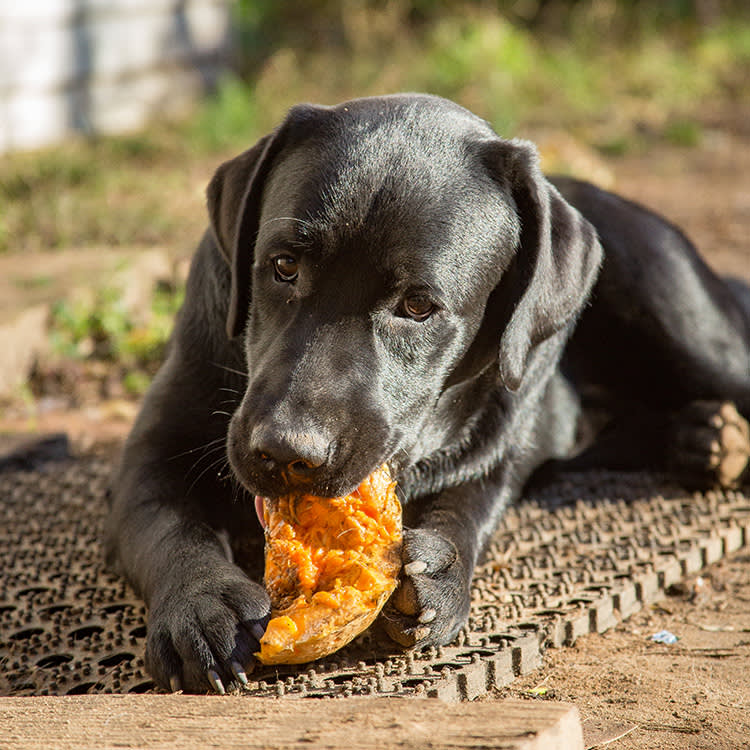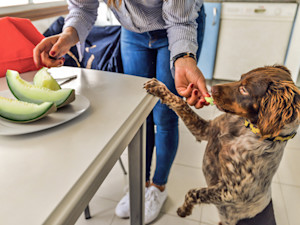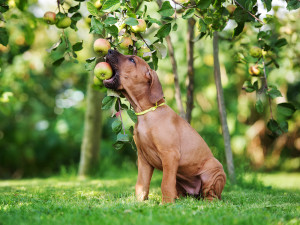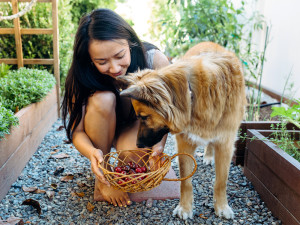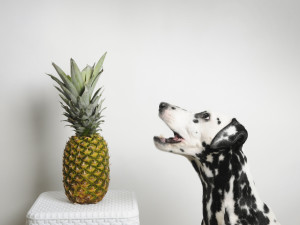Yes, dogs can eat papayas, and they can be a good source of essential fiber, vitamins, and minerals, such as vitamins A, E, K, and C, all of which will support your dog’s immune system.
Nutrition facts: Papayas for dogs
Are papayas good for dogs?
If you’re looking for a sweet summer treat for your pup, this tropical fruit has plenty of nutritional benefits. Like other fruits, papaya is loaded with fiber (see you later, constipation). They’re also a good source of beta-carotene (vitamin A), which the body can use as an antioxidant, and vitamin C which benefits a dog’s immune system. Here’s a breakdown of the benefits of papaya for dogs:
Vitamins A, C, K, and E support your dog’s immune system and help build proteins.
Fiber aids in digestion and supports the gut biome, reducing the risk of chronic diseases.
Minerals like calcium and potassium ensure strong bones and muscle function.
Digestive enzymes help break down nutrients from food, providing optimal absorption.
Can dogs eat papayas?
When it comes to papayas, fresh is best. Remove the skin and seeds, leaving only the fleshy orange meat. Cut it into small chunks or include it in a dog treat recipe like the one below.
Like other overly sweet fruits (pineapple, anyone?), papaya contains a lot of natural sugar, which can cause a mild stomach upset if your pup overeats. So, don’t go overboard. How much papaya your dog can eat depends on the size of your dog — a few bites are more than enough. Papaya is best served to dogs fresh, so steer clear of dehydrated and freeze-dried versions, which are overly concentrated in sugars.
How much do you spend on your pet per year?
If your pet has any gastrointestinal issues, is sensitive to GI conditions like pancreatitis, or has other health conditions (like allergies or diabetes), don’t serve your dog papaya. As always, before introducing any new food, consult your veterinarian with any questions or concerns.
Are papayas completely safe for dogs?
Avoid feeding your pup papaya skin, which is much too thick for them to properly digest. It could cause a mild stomach upset or, worse, potentially lead to intestinal obstruction. Similarly, papaya seeds are generally not recommended for dogs because they could cause stomach irritation and might contain trace amounts of cyanide. Not good for pups.
What other fruits are safe for dogs?
Peaches: Like papaya, peaches aren’t a traditional food for dogs, but if you’re looking for another sweet treat to feed to your pup, peaches are safe in moderation.
Pears: Due to their high water content, pears are very juicy and can make a great snack on hot days.
Blackberries: Blackberries are full of antioxidants and can make a great treat for your dog.
What fruits are dangerous for dogs?
Grapes: Because of their high amounts of tartaric acid, grapes are highly toxic for dogsopens in new tab and should absolutely not be given to your pet.
Persimmons: While dogs can safely eat persimmon fruit, the skin and seeds can cause life-threatening blockages in your pup’s digestive tract.
Watermelon: Watermelon seeds can be a choking hazard for your dog, and the rinds can be difficult to digest.
The bottom line: Can dogs eat human foods?
Yes, dogs can eat certain human foods, including fresh fruits like papaya. But it’s important to remember that papaya, like all treats, should be given to your dog in moderation, as a supplement to a complete and balanced dog food diet.
FAQs (People also ask):
Can dogs eat papaya?
Yes, dogs can eat papaya in moderation.
Are papayas completely safe for dogs to eat?
Fresh papaya fruit is safe for your dog to eat, but dehydrated and freeze-dried versions should be avoided because of their high sugar concentration. Papaya skin should be avoided due to its thickness, which can be difficult for dogs to digest; papaya seeds, too, could cause stomach irritation.
